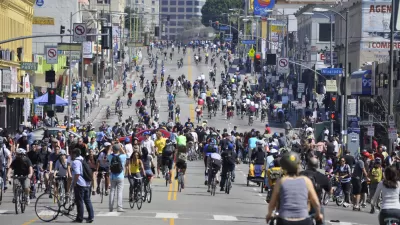Rolling Stone pundit Matt Taibbi writes that the media are missing the real story: that millions of Americans are financially drowning under home heating costs, gas prices and debt, and the middle class is disappearing.
Taibbi reports on a letter-writing campaign initiated by Vermont Senator Bernie Sanders, who asked his constituents to tell their stories of how difficult their lives had become. Hundreds of letters arrived, describing formerly comfortable middle-class families who avoid driving to church to save gas, are forced to burn their furniture to keep warm, or eat cereal and toast for supper. He concludes that politics are no longer about false red state-blue state debates, but about life and death:
"[T]imes are tougher economically in this country than perhaps they've been for quite a long time...Our economic reality is as brutal as it is for a simple reason: whether we like it or not, we are in the midst of revolutionary economic changes.
Now we have a new set of dire problems in the areas of home ownership and exploding energy prices. In both of these matters the basic dynamic is transnational companies raiding the cash savings of the middle class. Because those same companies finance the campaigns of our politicians, we won't hear much talk about getting private industry to help foot the bill to pay for these crises, or forcing the energy companies to cut into their obscene profits for the public good. We will, however, hear talk about taxpayer-subsidized bailouts and various irrelevancies like McCain's gas tax holiday.
We have officially spent and mismanaged our way out of la-la land and back to the ugly place where politics really lives -- a depressingly serious and desperate argument about how to keep large numbers of us from starving and freezing to death. Or losing our homes, or having our cars repossessed. For a long time America has been too embarrassed to talk about class; we all liked to imagine ourselves in the wealthy column. The reality is much different, and this might be the year we're all forced to admit it."
FULL STORY: America's Middle Class Can't Take Much More Punishment

Maui's Vacation Rental Debate Turns Ugly
Verbal attacks, misinformation campaigns and fistfights plague a high-stakes debate to convert thousands of vacation rentals into long-term housing.

Planetizen Federal Action Tracker
A weekly monitor of how Trump’s orders and actions are impacting planners and planning in America.

San Francisco Suspends Traffic Calming Amidst Record Deaths
Citing “a challenging fiscal landscape,” the city will cease the program on the heels of 42 traffic deaths, including 24 pedestrians.

Defunct Pittsburgh Power Plant to Become Residential Tower
A decommissioned steam heat plant will be redeveloped into almost 100 affordable housing units.

Trump Prompts Restructuring of Transportation Research Board in “Unprecedented Overreach”
The TRB has eliminated more than half of its committees including those focused on climate, equity, and cities.

Amtrak Rolls Out New Orleans to Alabama “Mardi Gras” Train
The new service will operate morning and evening departures between Mobile and New Orleans.
Urban Design for Planners 1: Software Tools
This six-course series explores essential urban design concepts using open source software and equips planners with the tools they need to participate fully in the urban design process.
Planning for Universal Design
Learn the tools for implementing Universal Design in planning regulations.
Heyer Gruel & Associates PA
JM Goldson LLC
Custer County Colorado
City of Camden Redevelopment Agency
City of Astoria
Transportation Research & Education Center (TREC) at Portland State University
Jefferson Parish Government
Camden Redevelopment Agency
City of Claremont



























